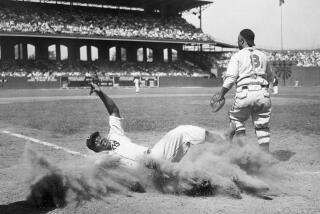A Compelling Case for Controversy Over Black Athletes
- Share via
“Blacks typically have a more dense skeleton, long arms and relatively longer legs. Blacks tend to have slender . . . hips. They tend to have proportionally less fat on their extremities.”
If Jimmy (The Goofy Greek) Snyder had said that when he was an employee of CBS Sports, he would have been fired. Well, actually, he did say it--sort of, in his own bumbling way--and he was fired.
But Robert Malina will not be fired from the University of Texas for saying it on NBC. That’s because he’s a white academic and anthropologist, not a white sportscaster with a log for a tongue who lost his job because of a double standard.
Malina gives his conclusions in “Black Athletes--Fact and Fiction,” an NBC documentary airing at 10 p.m. Tuesday on Channels 4, 36 and 39. It will be followed at 11:30 p.m. by a half-hour round-table discussion where you can hear some of the people you’ve just heard on the earlier program talk about the issues they’ve just talked about. In case you’re slow and didn’t get it the first time.
You’re right. It’s a dumb idea, especially as this program--reported by Tom Brokaw and written and produced by Jon Entine--is very good, very fair and stands on its own.
Round-table discussions have their place, but they’re too often a device to soften a program that’s deemed controversial, a way to gum it to death with talk. And this program is controversial, but only because it publicly suggests what countless avid sports followers know to be true and say privately.
In sport after sport, blacks are just plain better athletes than whites. No contest. Maybe it’s in the genes.
“The blacks, physically, are made better,” says track star Carl Lewis, who won’t get fired by anybody either.
Citing scientific sports studies, NBC makes a compelling--though not conclusive--case for genetic differences that give blacks a physical edge over whites in many sports.
One study concludes that blacks are generally built better for leaping and short bursts of speed. Anyone who has ever watched Julius Erving or Michael Jordan in an NBA basketball game would reach the same conclusion.
Not everyone here agrees that blacks are inherently superior athletes.
University of California sociologist Harry Edwards is not alone in finding other reasons for the preponderance of blacks in many sports. Edwards, who is black, notes that blacks have traditionally turned to sports in America only because racism and segregation have walled them off from other occupations. (Yet ironically, they can also be nearly shut out of movies depicting those very sports in which they’re prominent--witness the paucity of blacks in “Major League” compared with the percentage of blacks in the real Major League.)
NBC visits a high-school basketball star in Philadelphia to show how sports is seen as a ticket out of poverty for today’s black youngster, just as it was for the city’s Jewish youths in another era. And Sonny Hill, a black man who used to be a basketball analyst on national TV, maintains that blacks are now better at basketball only because it’s a city game, and blacks are dominant in the city. But somebody should try selling that notion to the kids who live for basketball in rural and small-town Indiana and Kentucky.
NBC briefly confronts the good body/bad brain stereotype here, noting that blacks have also excelled in the so-called “thinking” positions in sports--from quarterback to coach--when given the rare chance. It should be obvious by now that physical superiority in no way denotes mental inferiority.
When examining the differences in races, the sensitivity is understandable, given the history of racism--from anti-Semitism in Nazi Germany to segregation in the United States, where a residue of whites exploiting blacks lingers even today.
There’s a vein of truth in Edwards’ hyperbole when he equates cotton fields with football fields in charging that black athletes are essentially “gladiators” in the service of whites.
Seemingly to illustrate that charge, however, NBC inexcusably replays that infamous excerpt of Howard Cosell on ABC’s “Monday Night Football” in which he said about elusive black running back Alvin Garrett: “That little monkey gets loose, doesn’t he?”
Although Cosell was heavily criticized, the intent of his words was hardly racist, and in using the comment NBC delivers the cheapest of shots.
Meanwhile, Stanford University track coach Brooks Johnson maintains here that even raising the question of black athletic superiority is racist. Johnson, who is black, is searching for a “white Carl Lewis” to prove there is no genetic differences between the races. So far his search has proved futile.
More to Read
Go beyond the scoreboard
Get the latest on L.A.'s teams in the daily Sports Report newsletter.
You may occasionally receive promotional content from the Los Angeles Times.










